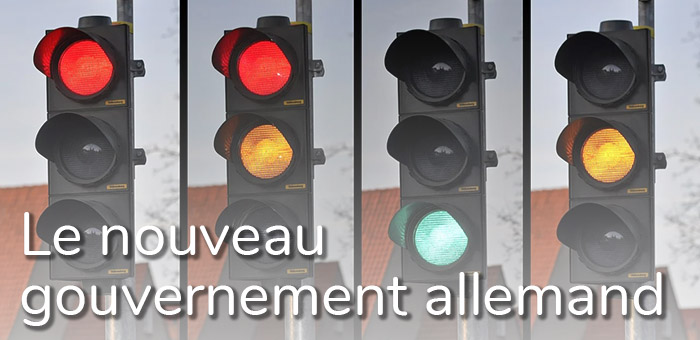
Le 8 décembre, le nouveau gouvernement allemand – une coalition entre le SPD, les Verts et le FDP – a pris ses fonctions sous son chancelier Olaf Scholz (SPD) élu par le Bundestag le même jour.
Organigramme du nouveau gouvernement allemand
Le 26 septembre, les Allemands ont voté pour élire leurs députés et choisir indirectement qui succèdera à Angela Merkel après 16 années à la Chancellerie. Le 24 novembre, le SPD les Verts et le FDP ont rendu public le contrat de coalition du gouvernement 'Ampel', programme qu'ils envisagent de mettre en place pour les 4 ans qui viennent.
Le contrat de coalition « feu tricolore » expliqué
Pour comprendre les enjeux de ce nouveau gouvernement pour l’Allemagne et l’Union européenne, vous pouvez retrouver dans ce dossier les publications de la Fondation et les débats que nous organisons autour des derniers développements en Allemagne, ainsi que nos interventions dans les médias et des ressources sur les programmes des partis en lice.
Nos Publications
Retrouvez ici toutes nos publications sur les élections allemandes et ses suites
Le Parti social-démocrate (SPD) arrive en tête des élections, mais la prochaine coalition gouvernementale pourrait être difficile à former
Observatoire des élections en Europe 2021-09-27
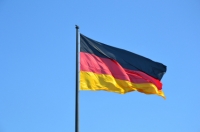
Le Parti social-démocrate (SPD) est arrivé en tête des élections allemandes le 26 septembre, avec 25,7% des suffrages et 206 élus au Bundestag. Il devance de peu l'Union chrétienne-démocrate (CDU-CSU) qui recueille 24,1% des voix et 196 sièges. Les têtes de liste des deux partis, le SPD Olaf Scholz et le CDU Armin Laschet, revendiquent de pouvoir mener les négociations pour former la prochaine coalition gouvernementale. Les Verts, avec 14,8% des voix et 118 sièges, et le Parti libéral-démocrate (FDP) qui a obtenu 11,5% des voix et 92 élus, semblent nécessaires pour former une coalition gouvernementale. Lire l'étude
Mauvaises nouvelles venues d’Allemagne
Édito 2021-09-27
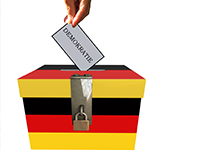
En Europe, les accords de gouvernement nécessitent de plus en plus de partis et les négociations pour construire les coalitions sont longues et laborieuses. L'Allemagne à son tour entre dans une telle période d'incertitude. A l'image écornée de la politique des partis pourrait s'ajouter l'immobilisme d'accords âprement négociés et gravés dans le marbre. Pourtant, le contraire serait nécessaire en ce moment, rappelle Jean-Dominique Giuliani. Lire l'édito
Incertitudes allemandes
Édito 2021-09-20
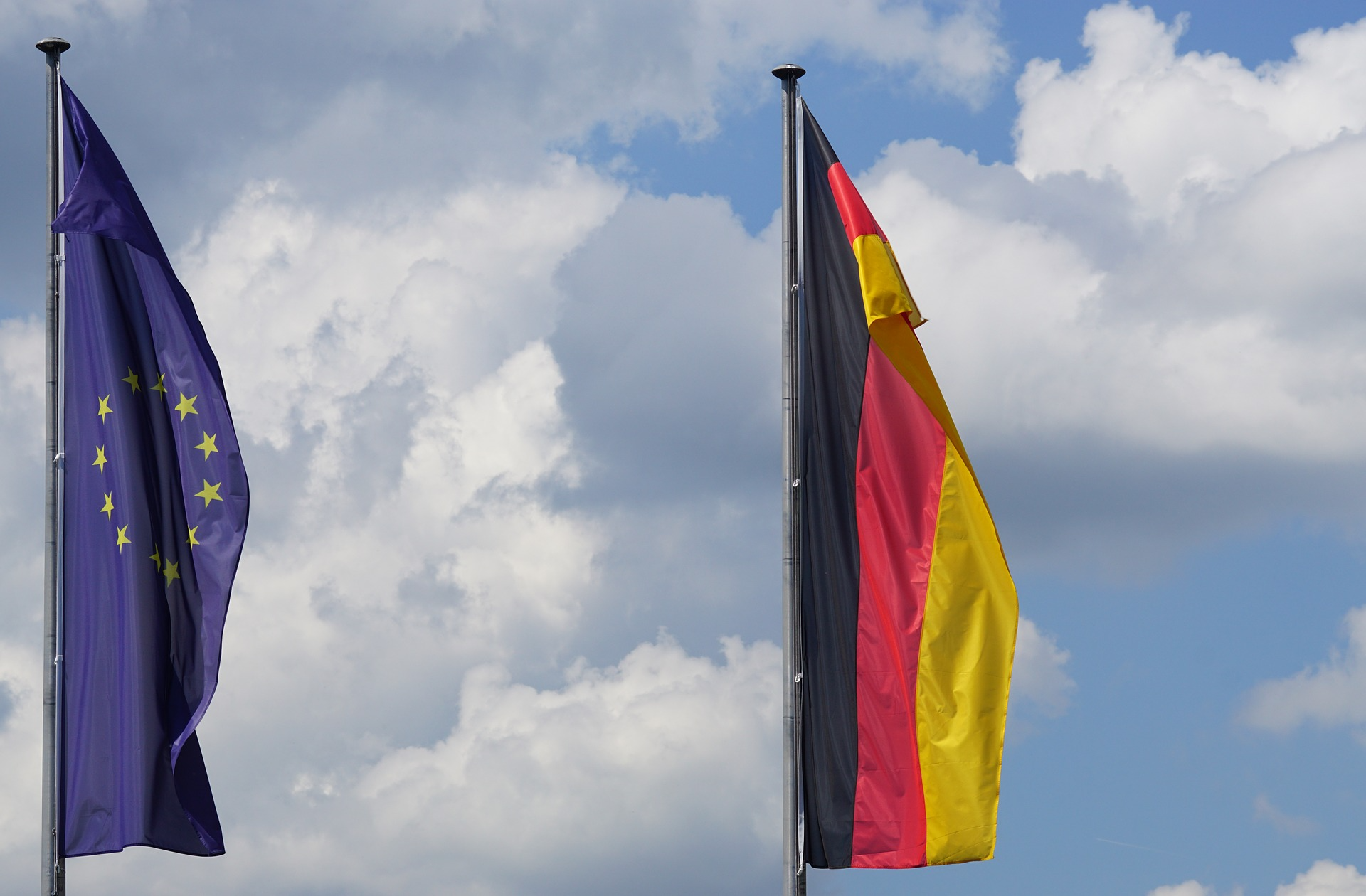
Les élections législatives allemandes du 26 septembre sont particulièrement importantes pour l'Europe. L'absence de débats de fond pendant la campagne et l'affaiblissement des grands partis laissent néanmoins présager de longs mois pour former une coalition et une crainte des réformes, ce qui pourrait se révéler préjudiciable aux avancées européennes, note Jean-Dominique Giuliani. Lire l'édito
Qui succédera à Angela Merkel ? L'Allemagne en pleine incertitude à trois semaines des élections fédérales
Question d'Europe 2021-09-06
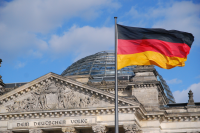
Les élections fédérales allemandes du 26 septembre amèneront un nouveau Chancelier au pouvoir, du fait qu'Angela Merkel, Chancelière depuis 2005, ne se représente pas. Au-delà de la personne qui sera choisie pour ce poste, la question est de savoir quelle coalition gouvernementale pourra être négociée et mise en place. A trois semaines du scrutin, plusieurs scénarios, aux positionnements politiques différents, et peut-être pour la première fois avec trois partis, sont envisageables. Lire la suite
L'Allemagne tourne la page Merkel
Question d'Europe 2021-04-26
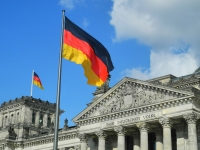
A la tête du gouvernement allemand depuis 2005, Angela Merkel quittera son poste après les élections fédérales du 26 septembre. Le scrutin annonce également un changement profond du paysage politique, avec des Chrétiens-démocrates qui cherchent à se renouveler, des Sociaux-démocrates en perte de vitesse et des Verts qui représentent pour la première fois une force alternative. Lire la suite
Nos Evènements
Les évènements organisés par et avec la Fondation Robert Schuman sur les élections en Alllemagne et ses suites
Élections allemandes. Quelles conséquences pour l'Europe et les relations franco-allemandes ?
19/10/2021
Pascale Joannin a été parmi les intervenants d'un événement sur l'avenir politique de l'Allemagne et son influence sur l'Europe et le franco-allemand organisé par la Maison de l'Europe de Paris en partenariat avec Confrontations Europe et Synopia.
Négociations post-électorales : quels enjeux pour l'Allemagne et l'Europe ?
11/10/2021
Qui sera le prochain chancelier allemand et avec quelle coalition gouvernementale ?
14/09/2021
La Fondation a organisé, le mardi 14 septembre, un débat en ligne sur l'Allemagne et ses élections fédérales qui se tiendront le 26 septembre. Le directeur du DFI Frank Baasner, l'ancien ambassadeur d'Allemagne Joachim Bitterlich et la correspondante Hélène Kohl ont analysé les enjeux de ce scrutin et discuté de l'avenir politique d'une Allemagne avec un nouveau chancelier et un nouveau gouvernement.
L'Allemagne tourne la page Merkel
12/05/2021
La Fondation a organisé une débat en ligne autour de l'Allemagne et son avenir politique avec le Directeur du DFI Frank Baasner, l'ancien Ambassadeur Joachim Bitterlich et la correspondante Hélène KOHL.
Interventions médias
Intervention des membres de la Fondation Robert Schuman sur les élections allemandes
Nouveau chancelier, nouvelles ambitions? Olaf Scholz dans l'arène européenne
AFP 2021-12-10

Pascale Joannin a été interrogée par l'AFP mondiale sur le nouveau contrat de coalition allemand et les ambitions européennes qui y figurent. Lire plus
Un nouvel élan pour la jeunesse européenne
OFAJ 2021-12-10

Suite à la formation d'un nouveau gouvernement allemand, l'OFAJ a publié une interview avec Pascale Joannin dans sa lettre d'information sur les initiatives pour les jeunes dans le cadre franco-allemand et européen. Lire plus
Les ambitions européennes de la coalition allemande
Le Monde 2021-11-29

Dans un article publié par Le Monde, Eric Maurice revient sur le contrat de la nouvelle coalition allemande "feu tricolore". Lire plus
Allemagne : la nouvelle coalition et l'UE
Arte 2021-11-26

Dans une émission d'Arte sur le contrat de coalition allemand, Jean-Dominique Giuliani a été interrogé sur la place de l'Allemagne en Europe et et les ambitions européennes de la nouvelle coalition "feu tricolore". Lire plus
Périscope N° 55 : Quelle Allemagne pour l'Europe?
Le Figaro 2021-09-30

Dans un article du Figaro sur la place de l'Allemagne en Europe après ses élections fédérales, Jean-Dominique Giuliani revient sur les défis stratégiques, économiques et démographiques auxquels le pays fait actuellement face. Lire plus
Scholz, une victoire en trompe-l'œil pour la gauche européenne
AFP 2021-09-28

Suite à la victoire du parti socialiste allemand, l'AFP a publié un article sur la gauche européenne pour lequel Pascale Joannin a été interviewée. Lire plus
Après Merkel... ça se complique !
C dans l'air 2021-09-27

Sur le plateau de C dans l'air sur France 5, Jean-Dominique Giuliani a analysé, avec les autres intervenants, les résultats des élections fédérales allemandes. Lire plus
Élections allemandes : la chute de la CDU souligne le déclin des conservateurs européens
Les Échos 2021-09-27

Dans un article sur les partis conservateurs européens, le correspondant Karl De Mayer du journal Les Echos cite Eric Maurice et Pascale Joannin. Lire plus
L'Allemagne, la France et la planisphère
La Vie 2021-09-27

Dans un article de l'Informateur Corse, également publié par La Vie, sur le franco-allemand sous Angela Merkel, Jean-Dominique Giuliani revient sur sa relation avec les différents présidents français. Lire plus
Aufwiedersehen Mutti ! Qui peut succéder à Angela Merkel ?
Radio Classique 2021-09-27

Les membres du Comité scientifique de la Fondation Joachim Bitterlich et Frank Baasner ont été invités à la Matinale de Radio Classique pour parler des personnes qui pourraient assurer la succession de la chancelière allemande. Lire plus
Élections allemandes : l'Europe plongée dans l'incertitude
Le Figaro 2021-09-26

Suite aux élections fédérales allemandes, Jean-Dominique Giuliani a été interrogé par Le Figaro pour expliquer l'impacte des résultats sur la politique européenne. Lire plus
Élections fédérales en Allemagne : un scrutin serré pour succéder à la chancelière A. Merkel
France 24 2021-09-26

France 24 a invité Pascale Joannin à son émission spéciale le soir des élections fédérales allemandes du 26 septembre pour réagir en direct aux résultats. Lire plus
Union européenne: Angela Merkel partie, la nouvelle coalition allemande pèsera lourd sur le curseur européen
Le Soir 2021-09-24

Dans un article sur les élections fédérales allemandes, Philippe Regnier a interrogé Jean-Dominique Giuliani, président, et Pascale Joannin, Directrice générale de la Fondation. Lire plus
Élections fédérales en Allemagne : quel avenir pour la relation Paris-Berlin ?
Euronews 2021-09-24

Eric Maurice a été interviewé par Euronews pour analyser les élections fédérales allemandes et notamment les futures relations franco-allemandes. Lire plus
Angela Merkel: seize années sans chanceler
La Voix du Nord 2021-09-23

La Voix du Nord a publié un article sur les 16 années d'Angela Merkel à la chancellerie allemande et y revient sur les propos de Frank Baasner de la visioconférence " Qui sera le prochain chancelier allemand et avec quelle coalition gouvernementale ? " organisée par la Fondation. Lire plus
Vu d'Allemagne
LN24 2021-09-22

LN24 a invité Eric Maurice sur le plateau d'une émission sur les élections fédérales allemandes 2021. Lire plus
Qui succédera à Angela Merkel ? L'Allemagne en pleine incertitude à trois semaines des élections fédérales
L'Aurore du Bourbonnais 2021-09-20

L'Aurore du Bourbonnais a repris l'étude de Corinne Deloy sur les élections fédérales allemandes et les enjeux de ce scrutin. Lire plus
Sous-marins, départ de Merkel...
France Info TV 2021-09-17

Dans l'émission L'Info s'éclaire de France Info TV, Jean-Dominique Giuliani revient sur l'affaire des sous-marins et sur le départ d'Angela Merkel - des sujets qui posent des défis à l'Europe. Lire plus
Le système politique allemand
Bulletin Quotidien 2021-09-16

Le Bulletin Quotidien a publié un article dans lequel l'auteur revient sur les explications de Corinne Deloy concernant le système politique allemand qu'elle a exposées dans l'Observatoire des élections en Europe "Qui succédera à Angela Merkel ? L'Allemagne en pleine incertitude à trois semaines des élections fédérales". Lire plus
La montée des Verts/Alliance 90 en Allemagne : un feu de paille ?
Bulletin Quotidien 2021-09-16

Dans un article sur Les Verts allemands paru dans le Bulletin Quotidien, l'article de Corinne Deloy "Qui succédera à Angela Merkel ? L'Allemagne en pleine incertitude à trois semaines des élections fédérales" est cité. Lire plus
La difficulté pour le SPD et son candidat Olaf Scholz d'incarner le changement
Bulletin Quotidien 2021-09-15

Dans un article sur le parti social-démocrate allemand et son candidat principal paru dans le Bulletin Quotidien, le papier de Corinne Deloy de la Fondation "Qui succédera à Angela Merkel ? L'Allemagne en pleine incertitude à trois semaines des élections fédérales" est cité. Lire plus
La CDU face au départ de la chancelière Angela Merkel
Bulletin Quotidien 2021-09-14

Dans un article sur le parti Chrétien démocrate de la chancelière allemande, l'étude "Qui succédera à Angela Merkel ? L'Allemagne en pleine incertitude à trois semaines des élections fédérales" de Corinne Deloy de la Fondation est citée. Lire plus
Le président de la République Emmanuel Macron reçoit les deux principaux candidats à la Chancellerie allemande à trois semaines d'un scrutin à l'issue incertaine
Bulletin Quotidien 2021-09-08

Dans un article sur les élections fédérales en Allemagne, le Bulletin Quotidien fait référence à l'étude "Qui succédera à Angela Merkel ? L'Allemagne en pleine incertitude à trois semaines des élections fédérales" de Corinne Deloy de la Fondation. Lire plus
Merkel quitte l'Europe
L'info du vrai 2021-06-02

Jean-Dominique Giuliani a été invité sur le plateau de L'info du Vrai de Canal+ pour parler des conséquences potentielles du départ d'Angela Merkel en tant que Chancelière allemande. Lire plus
Le dernier Conseil des ministres franco-allemand d'Angela Merkel
France Info TV 2021-05-31

Pascale Joannin a accordé un entretien à France Info TV pour parler des relations franco-allemandes à l'occasion du dernier Conseil des ministres franco-allemand auquel Angela Merkel participera en tant que Chancelière. Lire plus
Podcasts
La politique après Merkel : le Podcast du DFI
Dix épisodes pour tout comprendre des élections fédérales allemandes du 26 septembre 2021.
Merkel s'en va et après ? Les candidats, les enjeux, les grands thèmes décortiqués en français au fil des trente derniers jours de cette campagne capitale, pour l'Allemagne et pour l'Europe.
Une série présentée par Hélène Kohl en collaboration avec le dfi (Institut franco-allemand de Ludwigsburg).
Episode 15 Les visages de l'Après-Merkel (2)
Episode 14 Les visages de l'Après-Merkel (1)
Episode 14 La CDU cherche la sortie de Krise
Episode 13 L'Europe attend l'Allemagne
Episode 12 La future coalition au rayon X
Episode 11 Kanzler en quête de Koalition
Episode 10 L'après-Merkel a commencé
Episode 9 Bilan d'une campagne inédite
Episode 8 Quelle nouvelle Allemagne dans le monde ?
Episode 7 Les Libéraux faiseurs de chancelier
Episode 6 Retour sur le débat télévisé
Episode 5 L'AfD en pleine radicalisation
Episode 4 La Realpolitik des Verts allemands
Episode 3 L'inattendu Monsieur Scholz
Episode 2 Laschet est-il encore favori ?
Episode 1 Comment succéder à Merkel
Bande Annonce Présentation du Podcast
Ressources
• Le nouveau gouvernement
• Élection du nouveau chancelier par le Bundestag
• Le contrat de coalition (en allemand)
• Les programmes des principaux partis (en allemand)
